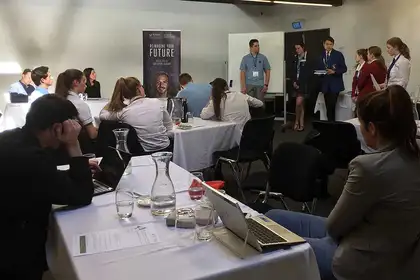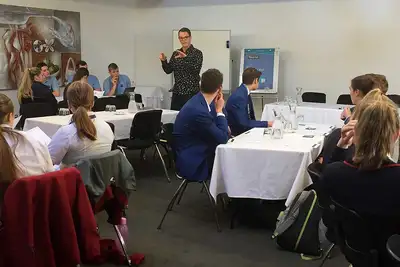
Taranaki secondary school students share their views on how technology will affect the future.
The impact of rapid technological change on everything from the environment to mental health, jobs and online privacy was the hot topic at a symposium for Taranaki teenagers hosted by Massey University in New Plymouth last week.
About 30 Year 12 and 13 young leaders from five secondary schools across the region took part in the Shout it out: Young People Find Their Voice symposium organised by the College of Humanities and Social Sciences. The symposium, also to run in Palmerston North and Hawke’s Bay, is designed to empower young people to learn about leadership by grappling with big issues that concern and affect them, to apply critical thinking in seeking solutions and to find ways to get their views heard.
The students worked in mixed groups on the topic of the Fourth Industrial Revolution and the challenge this poses for the future of today’s young people. The Fourth Industrial Revolution is defined by the World Economic Forum as “a technological revolution that will fundamentally alter the way we live, work, and relate to one another” and “will be unlike anything humankind has experienced before” in its scale, scope, and complexity. It is marked by breakthroughs in a range of emerging technologies such as artificial intelligence, robotics, nanotechnology, biotechnology and developments such as autonomous vehicles, 3D printing and a new generation of wireless technologies.
Introducing the day, politics lecturer Professor Richard Shaw gave an outline of the topic – new to many in the room – highlighting diverse potential impacts of future technologies, including more sophisticated digital data mining for surveillance, commercial profit and political influence. The question of transparency and privacy of personal data was also raised, along with massive changes to the workplace as more than 40 per cent of current jobs are expected to become automated, while jobs yet to be thought of will be created.
The students collaborated to come up with their response to the issue and took turns to present them in a Dragon’s Den-style scenario to the wider group and two guest panellists – local councillor Stacey Hitchcock and Taranaki Chamber of Commerce deputy chair Daniel Fleming.
One group said young people need to be better educated to have greater awareness of technological developments and impacts, particularly in areas such as fake news and mental health through exposure to damaging advertising and manipulation of personal data.
Another group talked about the need for schools to better prepare young people to adapt to a fast-changing world of work by fostering practical and transferable skills through internships, apprenticeships and job placements. Ms Hitchcock suggested the students seek to contribute to the Ministry of Education’s National Certificate of Educational Achievement (NCEA) review with their ideas for curriculum innovation.

Professor Richard Shaw gives an overview on the Fourth Industrial Revolution at the start of the symposium.
Digital technology and mental health link concern
The undermining of mental health and quality of relationships through increasing addiction to social media and online consumerism was a concern for another group, which called for a culture change through information and understanding of what technology is doing to human values and behaviour. A fourth group spoke out on the environmental impact of e-waste resulting from relentless consumer demand for the latest technology or designer device. They suggested a public education campaign about the damage of e-waste to the environment and pressure on manufacturers to be more responsible in regard to packaging and managing e-waste.
Ms Hitchcock told the students they had great ideas and should not underestimate their capacity to influence decisions. “Push yourselves, invite yourselves to the table – don’t wait to be asked,” she told them.
Professor Shaw urged the students to continue their conversations beyond the symposium among friends, family and communities, and to network. “You have things to say that older people want to hear,” he said.
Students from New Plymouth Girls’ High School, Inglewood High School, Francis Douglas Memorial College, Sacred Heart Girls’ College and St Mary’s Stratford attended the symposium that is now in its fourth year.